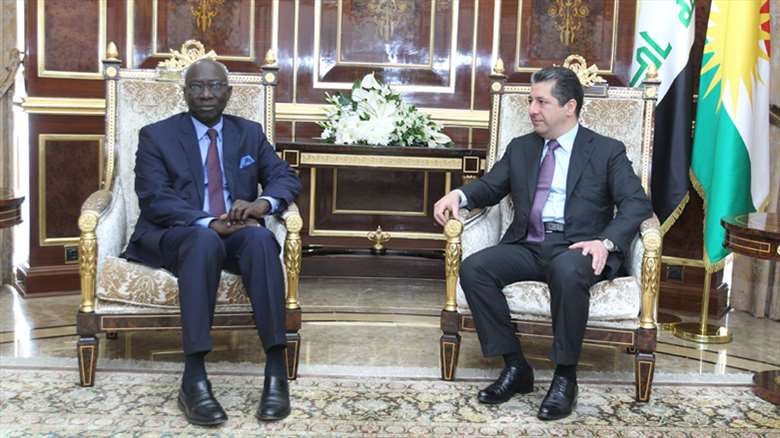UN genocide envoy discusses ISIS crimes with top Kurdistan officials

ERBIL (Kurdistan 24) – A United Nations delegation focused on genocide and other war crimes committed by the Islamic State in Iraq and Syria met with senior officials from the Kurdistan Region in Erbil on Tuesday.
Prime Minister of Kurdistan Regional Government (KRG) Masrour Barzani received Adama Dieng, the UN Secretary-General and Special Adviser on the Prevention of Genocide, and Karim Khan, Special Adviser and Head of the Investigative Team to Promote Accountability for Crimes Committed by the Islamic State (UNITAD).
In July, Khan called for the trial of members of the group in an international tribunal similar to that in Nuremberg that prosecuted prominent Nazi figures after World War II.
Read More: UN team probing ISIS crimes in Iraq calls for Nuremberg-style international tribunal: report
Khan and his almost 80-person team have been working in Iraq for about a year and a half on their endeavor, analyzing up to 12,000 bodies exhumed from 200 mass graves left behind by the Islamic State, 600,000 videos showing the group’s crimes, and 15,000 “internal ISIS documents.”
According to a KRG statement, both sides stressed the importance of international efforts to prevent mass killings, including genocide, in all forms.
Prime Minister Barzani and Special Advisor Dieng discussed methods to further develop coordination between Kurdistan Region and the UN to document the myriad atrocities committed by Islamic State militants, to focus on holding those responsible to account, and to discuss justice for the extremist group's victims.
The envoy recognized continued KRG’s efforts to protect the rights of ethnic and religious minorities and promote the culture of peaceful coexistence in the Kurdistan Region.

The delegation also met with Kurdistan Region President Nechirvan Barzani, who “reiterated Kurdistan Region’s support and readiness to cooperate with the United Nations in investigating the crimes committed by the Islamic State against the peoples of Iraq in general, especially Yezidi [Ezidi] and Christian citizens.”
President Barzani affirmed the KRG's support for “the rights of all the components of the Kurdistan Region, regardless of their ethnic and religious backgrounds, and will highlight these rights in [the Kurdistan Region's] new constitution.”
He also spoke about “the situation of the internally displaced and reasons why they can’t go back to their home areas,”
In late February, the mayor of Sinjar (Shingal) criticized Baghdad's ongoing efforts to close displacement camps because members of the Ezidi religious minority who fled the area after it was violently occupied by the Islamic State in 2014 are still not able to return because of security concerns and a stark lack of both services and infrastructure available in the area.
Read More: Failing security, services keep Iraq's displaced Yezidis from returning home
Special Advisor Dieng “briefed the President on his joint visit with Mr. Khan to the Kurdistan Region and Iraq, including their visits to areas that were once under ISIS control, meeting with surviving victims and their families, and efforts to collect evidence of war crimes,” read a statement from Barzani's office.
The meeting concluded with both sides discussing plans to further strengthen ”cooperation and coordination between the Kurdistan Region and the United Nations,” emphasizing “the process and legal aspects of documenting the crimes committed by ISIS terrorists against all the peoples of Iraq and benefiting from the experiences of other countries in this regard.”
Editing by John J. Catherine
